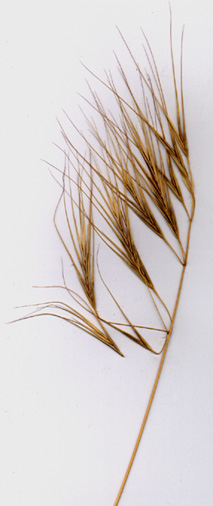
|
| Ripgut Grasses |
| Bromus diandrus Roth. |
| Bromus rigidus Roth. |
| Bromus sterilis L. |
| Bromus tectorum L. |
Grass Family; GRAMINEÆ (POACEÆ)
|
| Ripgut grasses rank high on my "hate list." For years I've fought to rid them from my garden. Like an annual ritual, I resolve
to eliminate every bit from the garden. Since I'm well acquainted with the fiends, know their ways, and curse their existence, you
might wonder why I've spent much time, but am attacking them
still. |
| You may think I'm inept, lazy, ignorant, impatient, or a mixture thereof. Be that as it may, I swear by all that is holy that even
a saintly genius would find fighting these grasses a grueling job. The three weedy grasses previously covered in this column
(Annual Bluegrass, Crabgrass, and Quackgrass) have,
all together, not caused me the bother of Ripgut. |
| Two of the four Ripgut grasses listed above infest my life. All these species are annuals, which sprout in fall or winter,
flower (such as grasses do) in May or June, then turn to straw as their viciously sharp seeds ripen, to painfully
catch in our shoes, socks, and pants legs, or to "rip" the mouths or bellies of livestock. |
| From humanity's point of view, these cursed weeds are good for practically nothing, except as early spring forage. They
grow like demons, displace native perennial grasses, shatter seeds sharp as fish-hooks, and multiply shamelessly. Cheat grass is an
alternate name. They are European species, but long ago invaded North America. Note: many
Bromus grasses exist; some are native and
very beneficial; only those singled out as Ripguts (called
Anisantha species by some botanists) are terrors. |
| Ripgut prefers sunny sites and sandy soils. Poor lawns will do if infrequently mowed. If you harbor a population of this grass,
try plucking every specimen, roots and all (they're easily yanked-up, fortunately), while they're in bloom. This method has failed
me because at that period in late spring I'm too busy, and inevitably let the seeds ripen to their admittedly lovely purplish color. Or at
any rate I miss some of them, especially dwarf ones. |
Both of my neighbors also are plagued by Ripgut, which doesn't help my cause. Fighting this grass is a good outlet for
aggression: pretend you're trying to defend inviolate purity from foul villainy.
|
Originally published as the Seattle Tilth newsletter Weed of the Month in March 1993, along with an illustration from a book.
Back |
|
|

